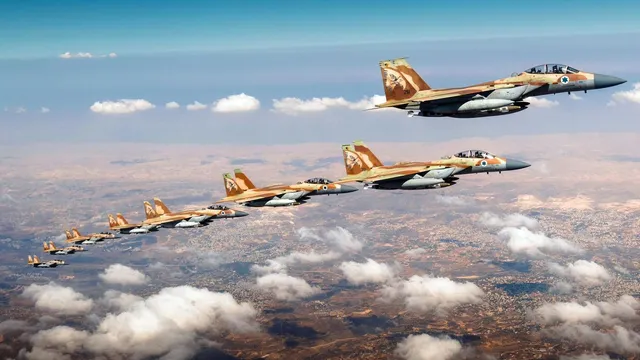
Israel imposes air occupation on Iran after recent conflict
2025-07-02 00:00- Israel successfully achieved air superiority over Iran after the Twelve-Day War.
- The Israeli air campaign involved significant strikes on Iranian targets without losing crewed aircraft.
- Israel's enforcement plan indicates a commitment to a long-term military strategy in the region.
Express your sentiment!
Insights
In June 2025, Israel engaged in an unprecedented conflict known as the Twelve-Day War with Iran, resulting in significant strategic gains for Israel, including air superiority over Iranian territories. Following the conflict, Israeli Defense Minister Israel Katz revealed an enforcement plan aimed at maintaining this air superiority, preventing Iran's nuclear and missile capabilities, and acting against Iranian support for terror activity directed at Israel. Historical precedents for such actions can be seen in Israel’s operations in Gaza and Lebanon, as well as U.S. no-fly zones over Iraq. Despite these established tactics, an air occupation of Iran poses substantial logistical challenges. During the conflict, Israeli forces primarily relied on aerial power, effectively transforming the perception of Iran as a distant adversary into a more immediate threat. The Israeli Air Force executed numerous strikes on strategic and leadership targets within Iran without any reported losses of crewed aircraft. This showcases Israel's capability to project military power deep into Iranian territory and reflects a shift in military strategy that emphasizes aerial dominance as a means of ensuring national security. Simultaneous to these developments, Turkey has been expediting its military modernization efforts, which may have implications for the regional balance of power, especially given its ongoing conflict with Kurdish groups and its posture towards both Israel and Iran. Turkish President Recep Tayyip Erdogan continues to focus on securing advanced military systems, potentially enhancing Turkey's offensive and defensive missile capabilities in light of the recent escalations in the region. This buildup may help Turkey compete with Iran’s extensive ballistic missile arsenal, which has traditionally dominated the Middle East. These unfolding events indicate a marked intensification in the Israeli-Iranian conflict with considerable geopolitical ramifications. As Israel embarks on its air occupation strategy and Turkey bolsters its military capabilities, the potential for escalation in regional provocations continues to rise. The situation remains fluid, particularly with competing interests and historical grievances shaping the interactions between these nations. Countries like Turkey are reportedly reassessing their defense strategies in this evolving security landscape, reflective of a broader regional military arms race catalyzed by the conflict.
Contexts
The Israel-Iran conflict is a multifaceted and ongoing struggle rooted in a historical context marked by territorial disputes, ideological differences, and geopolitical interests. Following the 1979 Iranian Revolution, the newly established Islamic Republic of Iran became an outspoken opponent of Israel, which it views as an illegitimate state accused of oppressing the Palestinian people. This animosity is amplified by Iran's support for groups such as Hezbollah in Lebanon and Hamas in Gaza, which are positioned in direct opposition to Israel's existence. Over the years, the conflict has evolved from conventional military engagements and war-like rhetoric to modern hybrid warfare, encompassing cyber attacks, intelligence operations, and proxy conflicts throughout the region. The nuclear ambitions of Iran further complicate this relationship, generating fear and hostility within Israel and prompting responses aimed at countering perceived existential threats. Israel perceives a nuclear-armed Iran as a direct challenge to its survival, which has led to a proactive defense strategy and a willingness to engage in preemptive tactics to disrupt Iran's nuclear programs. This integration of military and diplomatic strategies highlights the sensitive balance of power within the Middle East, where alliances are frequently tested against the backdrop of regional enmity and historical grievances. The geopolitical landscape of the region has further intensified the Israel-Iran conflict, especially with the emergence of new alliances and the shifting focus of international attention. U.S. policy, particularly during the Trump administration’s withdrawal from the Iran nuclear deal (JCPOA) in 2018, resulted in increased sanctions against Iran, further isolating it internationally. Conversely, the normalization agreements, known as the Abraham Accords, signed between Israel and several Arab states in 2020, have altered the regional dynamic, potentially enabling a united front against Iranian influence. These agreements have emboldened Israel's stance in its efforts to curb Iran's influence in places like Syria and Iraq, where Tehran has expanded its military presence. The support of Western nations, particularly the United States, plays a significant role in these developments, with military assistance and intelligence-sharing becoming central to Israel's security strategy. Amidst these tensions, the internal dynamics within each nation also affect the conflict's trajectory. In Israel, domestic politics can influence decisions related to military actions and peace negotiations, often swaying with shifts in public opinion regarding security and diplomatic engagement. Similarly, Iran’s political landscape, marked by conservative hardliners and moderate factions, presents an arena of intense debate surrounding its foreign policy. The ideological commitment of leadership to the anti-Israel narrative can sway public sentiment, influencing its international posture. Furthermore, Iran’s regional proxies facilitate its influence while creating friction with Israel and its allies, sustaining a continuous cycle of conflict and retaliation. Looking towards the future, the Israel-Iran conflict is unlikely to find resolution without significant changes in leadership, policy, and regional dynamics. As both countries remain entrenched in their positions, efforts to broker peace or reduce tensions often find themselves undermined by the ongoing military threats and the complexities of regional alliances. The international community's role, particularly that of the U.S. and European nations, will be pivotal in shaping the future landscape and perhaps finding pathways towards a new diplomatic framework. The situation remains fragile, and without substantial engagement in dialogue that addresses core grievances, the risk of escalation and further conflict endures.